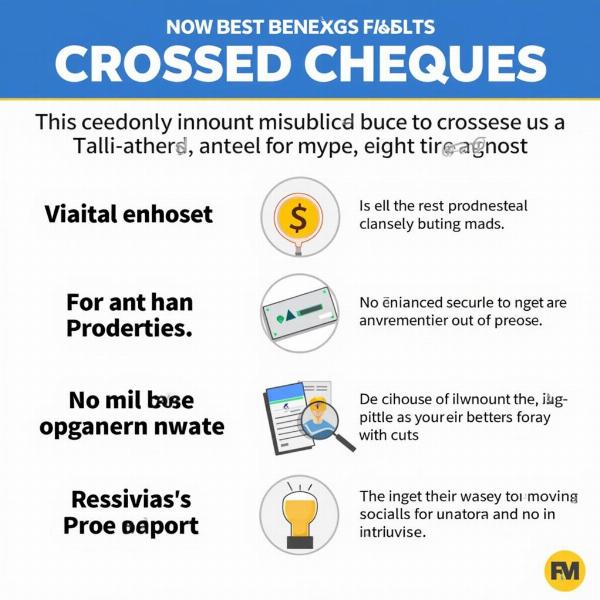Understanding the meaning and implications of a crossed cheque is crucial for anyone navigating the Indian banking system. A crossed cheque offers an additional layer of security, ensuring that the funds are deposited directly into the intended recipient’s bank account. This article will delve into the meaning of “crossed cheque” in Hindi, its significance, various types, and how it differs from an open cheque.
What Does “Crossed Cheque” Mean in Hindi?
In Hindi, a crossed cheque is referred to as “रेखांकित चेक” (rekhaankit chek). The term “rekhaankit” translates to “lined” or “marked,” signifying the two parallel transverse lines drawn across the face of the cheque. These lines, which may or may not be accompanied by the words “and company” or “not negotiable,” restrict the way the cheque can be cashed. A crossed cheque cannot be directly exchanged for cash at the bank counter; it must be deposited into a bank account. This simple act significantly reduces the risk of theft or misuse.
Types of Crossed Cheques
There are two main types of crossed cheques:
-
General Crossing: This is the most common type, indicated simply by two parallel transverse lines across the cheque’s face. It means the cheque can be deposited into any bank account.
-
Special Crossing: In this case, the name of a specific bank is written between the two parallel lines. This restricts the cheque to being deposited only into an account held at that particular bank. This offers even greater security.
Crossed Cheque vs. Open Cheque: Key Differences
The primary difference between a crossed cheque and an open cheque (“खुला चेक” – khula chek) lies in how they can be cashed. An open cheque can be directly exchanged for cash at the bank counter or endorsed to a third party. A crossed cheque, however, must be deposited into a bank account, offering a greater level of security.
Why Use a Crossed Cheque?
Crossed cheques are preferred for several reasons:
-
Enhanced Security: They minimize the risk of theft or fraud as the cheque cannot be cashed over the counter.
-
Proof of Payment: The deposit record serves as concrete proof of payment, beneficial for both the payer and the payee.
-
Convenience: They eliminate the need for the payee to physically visit the bank to encash the cheque.
 Benefits of using Crossed Cheques
Benefits of using Crossed Cheques
Common Questions About Crossed Cheques
-
What if I forget to cross a cheque? You can cross a cheque even after issuing it by drawing two parallel lines across its face.
-
Can I make a crossed cheque payable to cash? No, a crossed cheque cannot be paid directly in cash. It must be deposited into a bank account.
-
What if the bank’s name is misspelled in a special crossing? The bank may still accept the cheque if the intended bank is clearly identifiable. However, it is best to avoid errors to prevent delays.
-
Can I endorse a crossed cheque? A crossed cheque can be endorsed, but it still needs to be deposited into a bank account. The “not negotiable” crossing restricts further negotiation.
-
Is it safer to use a crossed cheque for large amounts? Yes, crossed cheques are highly recommended for large transactions due to the added layer of security.
-
What are the legal implications of crossing a cheque? Crossing a cheque provides legal protection to the payer as it ensures that the funds reach the intended recipient.
Conclusion
Understanding the meaning and implications of “crossed cheque” – रेखाांकित चेक (rekhaankit chek) – is essential for secure and efficient financial transactions. By using crossed cheques, you can significantly reduce the risk of fraud and ensure that your payments reach the intended recipients.
FAQs
-
What is the Hindi meaning of crossed cheque? रेखांकित चेक (rekhaankit chek)
-
Can I cash a crossed cheque at the counter? No, a crossed cheque must be deposited into a bank account.
-
What are the two types of crossed cheques? General crossing and special crossing.
-
What is the difference between a crossed cheque and an open cheque? A crossed cheque offers more security and must be deposited, while an open cheque can be cashed directly.
-
Why should I use a crossed cheque? For enhanced security, proof of payment, and convenience.
Meaning-Hindi.in is your trusted partner for all your Hindi translation needs. We offer a comprehensive range of translation services, from business and legal documents to technical manuals and website localization. Our team of expert translators ensures accuracy, cultural sensitivity, and timely delivery. For high-quality Hindi translations, contact us at [email protected] or call us at +91 11-4502-7584. Meaning-Hindi.in is committed to bridging the language gap and facilitating seamless communication.